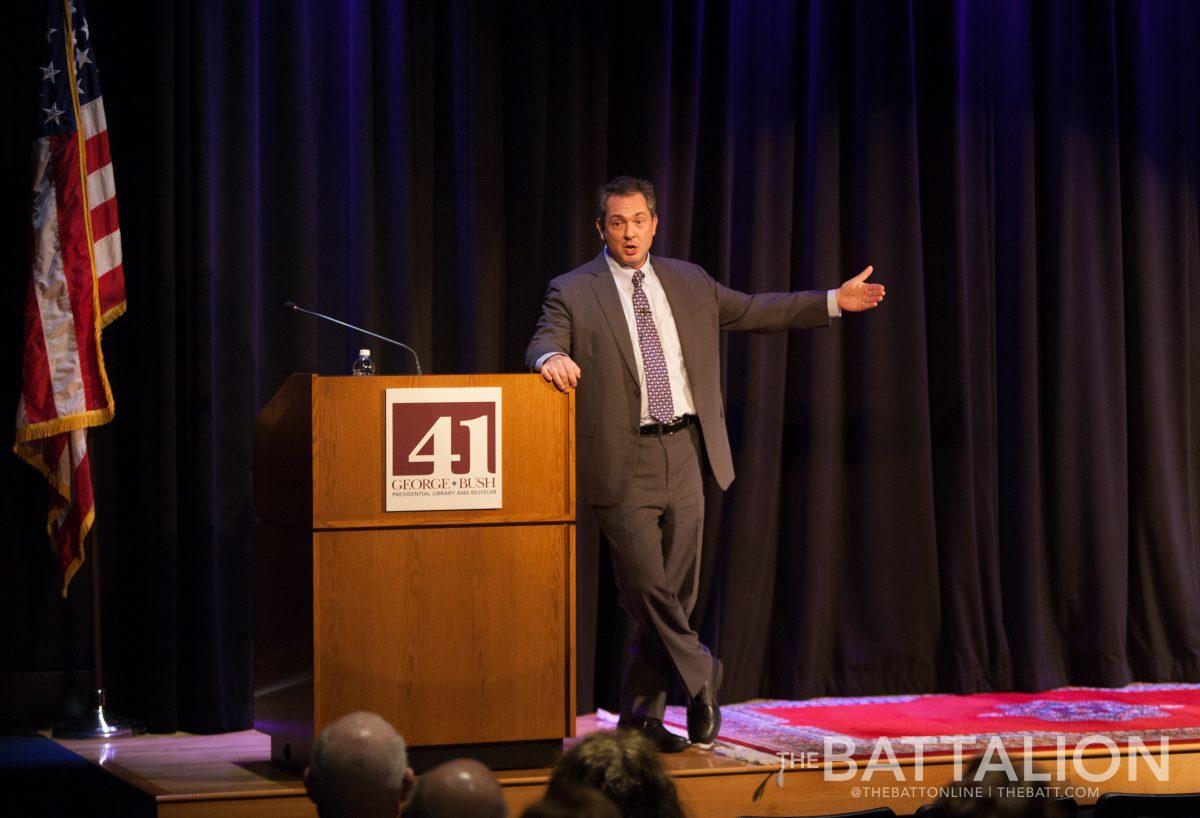In celebration of President’s Day, the George Bush Presidential Library hosted Jeffrey Engel, director of the Center for Presidential History at Southern Methodist University, to shed a light on the library’s namesake and his handling of the Cold War, on Tuesday.
Engel presented a synopsis of the former president’s career, and after a question and answer session, gave detailed context on Cold War-related topics including the Berlin Wall, NATO expansion and Chernobyl. Engel’s newest book, “The World Seemed New: George H.W. Bush and the End of the Cold War,” focuses on the former commander in chief’s strategies and conversations before and during his time in office.
Before his lecture, Engel emphasized the importance of work that might go unseen. Engel said most of what former president Bush did was out of the spotlight, yet he shaped loyal relationships with world leaders. Engel said by developing skills within high status positions for several years, Bush was able to handle the Cold War and Watergate with the use of careful speech.
“The point I’m trying to make is that Bush recognized throughout his entire career the importance of arguing within and arguing behind the scenes, but speaking quietly in front and — I would argue — that made all of the difference in the world when he ultimately became president in 1989,” Engel said.
Engel noted Bush’s criticism of Ronald Reagan on several topics and stressed the importance of a unified voice by a presidential administration, especially during a extended period of time with high stakes, such as the Cold War. Engel said Bush’s tactics of speaking only at certain moments pushed forward U.S. democratic ideals in Soviet-U.S. relations. In contrast, Reagan’s strategy and frame of the Soviets was: “we win, they lose,” according to Engel.
“Now I have taught strategy for 20 years, and I always tell my students, ‘That’s what we call an aspiration. That’s not a strategy,’” Engel said. “A strategy has tactics. A strategy has logistics. A strategy has something else that’s really important. A strategy answers the question, ‘What then?’”
Michelle Bogart, archivist for the George Bush Library, said she often works with Engel to gather information for his publications.
“We have all of the memorandums of conversations that President Bush had with foreign heads of state,” Bogart said. “Most of them are on our website actually, and they’ve been declassified. So sometimes [Engel] will go and pick information out of this that kind of tells the story, and it makes it real.”
Bogart said a fascinating aspect of the archived conversations of high status documentation is the humanization of political figures and the ordinary relationships they created with each other.
“There are some great stories that you see the world leaders are really people — that they have inside jokes with each other,” Bogart said. “And, to see the way George Bush when he had an issue, he would call someone on the phone. You know, he really cultivated those relationships.”
Phil Granberry, Class of 1961, attended the discussion and said he considers Bush a man of conviction.
“We were in a small group situation where he spoke on one occasion,” Granberry said. “This was at a time when race relations were moving forward, and some lady in the crowd asked him why he had supported the ability of blacks to move into white neighborhoods, and he basically said because it’s the right thing to do.”
Bush 41 highlighted in political author’s new book
February 21, 2018
Photo by Photo by Alyssa Denson
Jeffery Engel, director of the Center for Presidential History of Southern Methodist University, spoke at George H.W. Bush Library in honor of President’s Day.
Donate to The Battalion
Your donation will support the student journalists of Texas A&M University - College Station. Your contribution will allow us to purchase equipment and cover our annual website hosting costs.




















